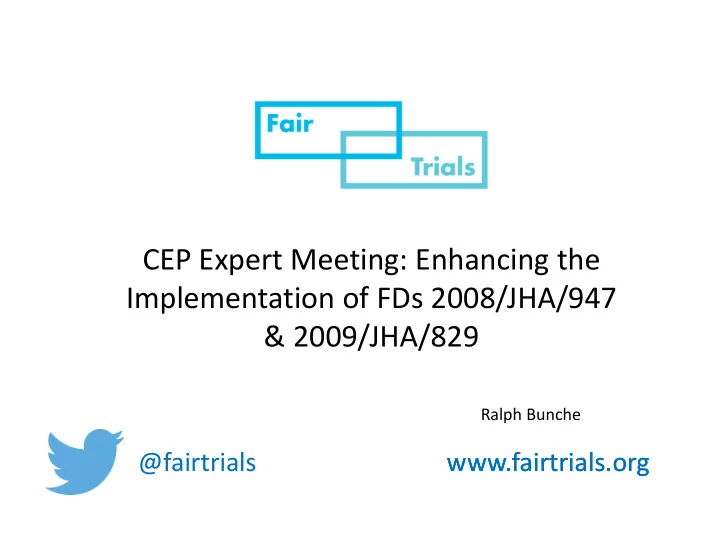

CEP Expert Meeting: Enhancing the Implementation of FDs 2008/JHA/947 & 2009/JHA/829 Ralph Bunche www.fairtrials.org www.fairtrials.org @fairtrials
Research project The Practice of Pre-trial detention: Monitoring Judicial decision-making and alternatives Funder: European Commission Coordinator: Fair Trials Research partners: University of West England , England and Wales. Centre for European Constitutional Law (CECL), Greece Hungarian Helsinki Committee (HHC), Hungary Irish Penal Reform Trust (IPRT), Ireland Antigone , Italy Human Rights Monitoring Institute (HRMI), Lithuania University of Leiden , Netherlands Polish Helsinki Committee (HFHR ), Poland Apador-CH, Helsinki Committee , Romania Asociacion pro Derechos Humanos de Espana (APDHE), Spain
Research project Research Methodology • Desk-based research – 10 countries • Defence practitioner survey – 544 lawyers participated • Hearing monitoring – 242 hearings attended • Case file review – 672 cases reviewed • Interviews – with 56 judges • Interviews – with 45 prosecutors Country Reports October – December 2015 Regional Report – May 2016 LEAP Experts Meeting – July 2016
Research project Findings: Pre-trial decision-making procedure • Inadequate Access to a Lawyer • Inadequate Quality of Lawyering • Inadequate Translation and Interpretation • Insufficient defence access to case materials essential for challenging pre- trial detention • Limited time/resources for all parties – including prosecutors and judges • Inequality of arms
Recommendations: Procedure Recommendations: Procedure • Prompt initial hearing and de novo initial review • Improve access to materials essential for challenging detention • Enforcement of the right of access to a lawyer • Ensuring that prosecution and defence arguments are treated equally
Research project Findings: The substance of pre-trial detention decisions • Presumption of Detention • Good example: England & Wales and Ireland • Detention grounds in tension with ECtHR standards • Gravity of offence – flight risk (Hungary, Greece, Spain, Lithuania, Romania, Netherlands) • Non-national or insecurely housed – flight risk (Greece, Italy, Spain) • Interference with evidence – unsubstantiated and without due diligence in investigation (Hungary) • Risk of reoffending – determined by offence type or unrelated/old offences (Lithuania) • Inadequate case-specific reasoning • PTD imposed for unlawful purposes: public opinion, to punish the guilty, to extract confessions
Recommendations: Substance Recommendations: The substance of pre-trial detention decisions • Enforcement of reasonable suspicion and threshold of crime with de minimus standard for imposition of PTD • Better regulation of lawful grounds for pre-trial detention • Explicit consideration of all available alternatives to demonstrate that PTD is a measure of last resort • Requirement to make reference to both prosecution and defence arguments and the specific facts of each case
Research project Findings: Review process & special diligence • Repetition of previous decision, not effective review • Suspect not always present at hearing, not always an oral hearing • Lack of special diligence, time limits and judicial control of the investigation • Good example: Netherlands, England and Wales • Widespread lack of awareness and application of ECtHR-standards
Recommendations: Review Recommendations: Review process -- Same procedural guarantees as in initial hearing: oral, adversarial hearing at which defendant and counsel can attend, reference to both parties’ arguments, reference to enduring strength of reasons for detention -- Regular Review and Hearing: Automatic, regular reviews (monthly?) plus ability to request ad hoc review on the basis of changed circumstances -- Judicial control over investigation through the use of interim time limits in relation to specific investigative acts -- Possibility of judicial review of detention by judge independent of the investigation -- Maximum time limits?
Research project Findings: Use of alternatives to detention • Lack of trust and experience in alternatives by judges leading to poorly reasoned decisions • Good practice: England & Wales • Good practice with problems: Ireland • Inadequate legislation • Practical obstacles to ordering pragmatic alternatives to detention • Need for increased enforcement of conditions to build faith
Recommendations: Alternatives • Increased investment in development of alternatives: bail hostels, drug treatment programs, to a lesser extent bail and electronic monitoring • Greater development and use of dedicated pre-trial services, borrowing from probation context, for pre-trial risk assessment, supervision and enforcement of conditions of release • Judicial oversight of alternatives to ensure they do not overly infringe on liberty • Sharing of best practices and low-cost, practical solutions like Irish mobile phone monitoring
Recommend
More recommend